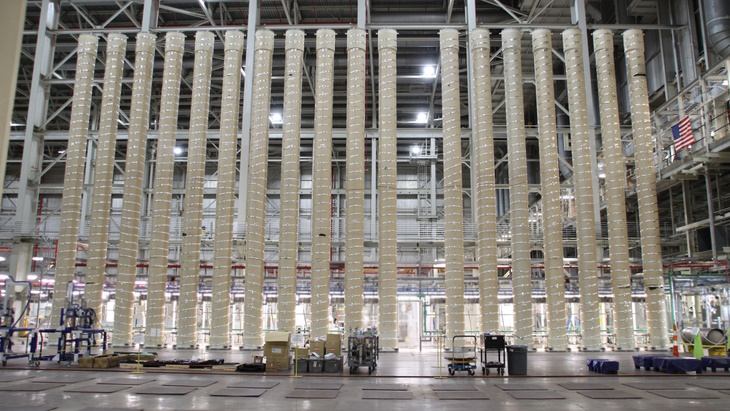Centrus on track for HALEU demonstration by year-end
The US company has completed construction of a cascade of advanced uranium enrichment centrifuges as well as most of the associated support systems and expects to begin demonstrating first-of-a-kind production of high-assay low-enriched uranium (HALEU) in Piketon, Ohio, by the end of 2023.

The HALEU cascade at Piketon (Image: Centrus)
Centrus began work on the facility where 16 advanced centrifuges will operate in a demonstration cascade in 2019. Last November, the US Department of Energy awarded it USD150 million of cost-shared funding to finish the cascade, complete final regulatory steps, begin operating the cascade, and produce up to 20 kg of HALEU by the end of this year.
Construction and initial testing of the cascade and most of the support systems is now complete. Before production can begin, support systems including a fissile materials storage area for on-site storage of HALEU must be completed. Nuclear Regulatory Commission (NRC) operational readiness reviews are also required under a 2021 amendment to Centrus's licence to allow the plant to produce HALEU. Piketon is currently the only production facility in the USA that is licensed by the NRC for HALEU production.
HALEU is enriched to between 5% and 20% uranium-235 - higher than the uranium fuel used in light-water reactors currently in operation, which typically contains up to 5% uranium-235. The high-assay fuel will be required by most of the advanced reactor designs being developed under the DOE's Advanced Reactor Demonstration Program, including two demonstration reactors slated to begin operation by the end of this decade.
This will be the first new US-owned, US-technology enrichment plant to begin production in 70 years, Centrus Energy Corporation said, and President and CEO Daniel Poneman described it as a major milestone for the advanced nuclear sector and for restoring US uranium enrichment capability. "We are strongly committed to pioneering production of HALEU to support the deployment of US advanced reactor designs around the world," he said, adding that the company aims to scale up the facility to meet the full range of commercial, government, and national security requirements for uranium enrichment, including low-enriched uranium for existing reactors as well as HALEU.
Production after the initial demonstration run will be at the DOE's sole discretion and subject to the availability of Congressional appropriations, Centrus said: it has previously been reported that production will continue in 2024 at a rate of 900 kg of HALEU per year, subject to appropriations, with additional options to produce more material under the contract in future years.
Centrus said it is also looking into the possibility of expanding HALEU production at the Piketon facility by adding further cascades, provided that sufficient funding or offtake contracts can be secured. This would be separate from the current operations contract.
A full-scale HALEU cascade of 120 individual centrifuge machines, with a combined capacity of approximately 6,000 kilograms of HALEU per year (6 MTU/year), could be brought online within about 42 months of securing the funding to do so, the company said, and an additional cascade could then be added every six months.
Researched and written by World Nuclear News
- China Institute of Atomic Energy
- Nuclear Power Institute of China
- Southwestern Institute of Physics
- China Nuclear Power Operation Technology Corporation, Ltd.
- China Nuclear Power Engineering Co., Ltd.
- China Institute for Radiation Protection
- Beijing Research Institute of Uranium Geology (BRIUG)
- China Institute of Nuclear Industry Strategy (CINIS)
- China Nuclear Mining Science and Technology Corporation


